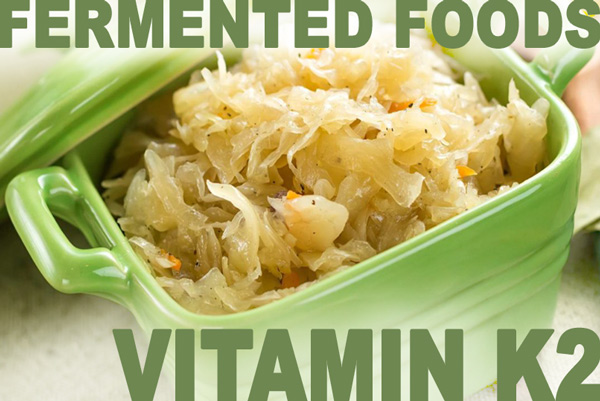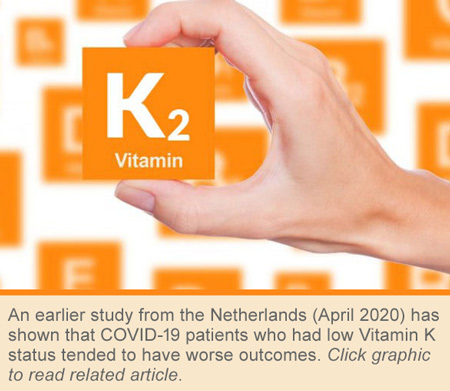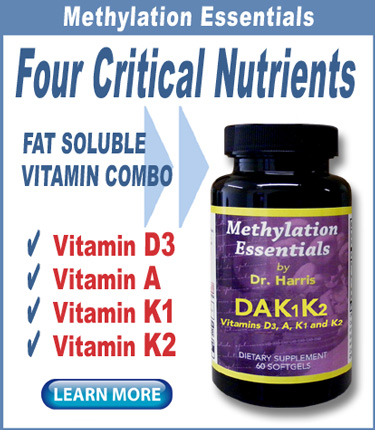In a new research paper published in Biocatalysis and Agricultural Biotechnology scientists have attempted to explain the association between Vitamin K2 deficiency and recovery rates in individuals with COVID-19.
According to the authors, COVID-19 patients were observed to have a “profound increase in inactive Matrix Gla Protein levels, indicating a poor K2 status and associated increased risk of mortality.”
Matrix Gla Protein, also known simply as MGP, is dependent upon Vitamin K2 to become active—and higher circulating MGP means healthier arteries and immune function.
Type of Vitamin K critical
Vitamin K is known for its role as a coagulation cofactor in the medical arena. In the nutritional sphere it is popular for supporting proper circulation and for bone and joint support. In addition, ongoing research is demonstrating that it is an important nutrient for immune function and overall longevity.
Vitamin K naturally exists in two forms: Vitamin K1 (phylloquinone) and Vitamin K2 (menaquinone). Both vitamin subtypes are vital nutrients; however, the two distinct forms of Vitamin K are vastly different with respect to their chemical structure and how they impact on immune health.
The New Zealand researchers noted the type of Vitamin K—and its deficienciey in the human population—was pivotal in their research:
“Research suggests that greater health benefits are associated with the intake of menaquinone in comparison to phylloquinone, particularly with the consumption of menaquinone-7 (Vitamin K2/MK-7), which is an exceptional form of menaquinone due to its high bioavailability.
“Studies have also found that menaquinone-7 has anti-inflammatory properties that are completely independent of its role as an enzyme cofactor. Menaquinone-7 is typically synthesised through bacterial fermentation; however, as a result of its low availability in the diet, deficiency of this vitamin is common.”
It is important to note that the research was a hypothesis paper. It was not a clinical trial.
A hypothesis is a proposed explanation for a phenomenon. For a hypothesis to be a scientific hypothesis, the scientific method requires that one can test it. Scientists generally base scientific hypotheses on previous observations that cannot satisfactorily be explained with the available scientific theories. That was the case with this hypothesis paper.
Second study examining COVID-19 benefit
For their hypothesis New Zealand researchers built on an earlier study from the Netherlands (April 2020) that had already made the Vitamin K2/COVID-19 link:
“We hypothesise that manifestations of COVID-19 and comorbidities associated with the severe form of this disease could be linked to Vitamin K2 deficiency. Therefore, this work aims to discuss how Vitamin K2 can support the prevention and treatment of the disease during the COVID-19 pandemic.”
Fortunately Vitamin K can be stored in the liver, and does not need to be consumed daily; however, repeated surveys demonstrate that most people do have inadequate levels due to typical diet choices. For this reason periodic supplementing is assumed to be highly beneficial.
Optimal Health Systems offers several formulas providing Vitamin K2 (menaquinone), and one product that provides a potent K1 and K2 combination. Please follow the links below for more information.
Optimal Longevi-D
(with K2, CoQ10 and Vitamin D)
Optimal 2 Vitamin/Mineral
(with K2 and all other essential vitamins and minerals)
Essential DAK1K2
(with both K1 and K2, and other fat-soluble vitamins)
– – –
Source: Biocatalysis and Agricultural Biotechnology / PubMed Central-NCBI.



